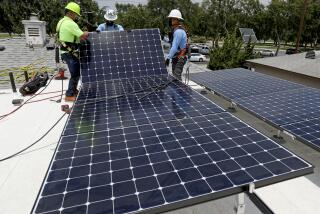Energy Star ratings are cheap, effective and popular. Why does Trump want to kill them?

The Trump administration has decided the immensely popular Energy Star program must go. (Sign up for our free video newsletter here http://bit.ly/2n6VKPR)
Commercial real estate giant CBRE is always on alert for shifts in federal government policy that might impact its vast property management and investment business.
But the Los Angeles-based Fortune 500 company never anticipated an effort to eliminate a voluntary, cost-effective initiative that has saved its customers millions of dollars and had almost no critics.
In a reflection of how much influence a handful of free-market think tanks wield over the White House, the Trump administration has decided the immensely popular Energy Star program must go.
The fight centers on the Environmental Protection Agency’s 25-year-old effort to boost efficiency in products and services by encouraging companies to compete for coveted, government-issued labels that certify a product or property meets high standards for saving energy and costs.
Functioning like a government seal of approval, the Energy Star program costs taxpayers a pittance and is widely beloved by the 16,000 companies and organizations that participate. Now it is fast becoming a test case of how committed the Trump administration is to pursuing the agenda of once-fringe groups seeking to slash government programs wherever they can.
“Never in my wildest thoughts have I considered something like this,” said Dave Pogue, who leads the sustainability efforts at CBRE. He said the program helped the firm cut energy use at its properties by 16% over the last decade.
It was a no-brainer. It worked, and it hardly cost any money.
— Christie Todd Whitman, former EPA head
The proposal has been met with shock across party lines. Christie Todd Whitman, who ran the EPA during the administration of George W. Bush said, “not in a million years” would she have targeted Energy Star. “There was no reason to,” she said. “It was a no-brainer. It worked, and it hardly cost any money.”
But in a Trump administration eager to roll back federal government action to confront climate change, Energy Star has come under scrutiny. The plan to jettison the program from the federal government, now embedded in the White House budget blueprint, emerged after Trump placed Myron Ebell, a prominent climate skeptic, in charge of his EPA transition team.
Ebell’s team disbanded in January and did not write Trump’s budget plan, which envisions a privatization scheme where industry would set its own definitions for what products are efficient and police standards itself. But the team provided the administration with a confidential list of proposals aimed at helping the president fulfill his stated goal during the campaign of shrinking the agency as much as possible. Ebell has been one of the most visible critics of voluntary government energy efficiency programs like Energy Star.
“The EPA is meant to improve environmental quality,” said Ebell, director of environmental initiatives at the Competitive Enterprise Institute, a libertarian think tank on the forefront of disputing the scientific consensus on climate change, as well as the health impacts of tobacco. “I’m not sure what that has to do with how much energy consumers use. But a great deal of the work at EPA has been dedicated to that. The president made clear during the campaign he will get rid of as much of that as he possibly can.”
The voluntary program’s legions of loyalists say Energy Star has everything to with environmental quality. The nation’s biggest companies compete aggressively to win Energy Star labels for their products, which signal to consumers that everything from the air conditioners they purchase at Best Buy to the buildings where they lease office space engage advanced technologies to use the least possible amount of power. The eagerness to meet consumer demand for that seal of approval has driven firms to invest big in cutting energy use.
Energy Star has been a pillar of the federal government’s effort to fight climate change, with the EPA boasting that it has kept some 2.8 billion tons of greenhouse gas from escaping into the atmosphere — or roughly the equivalent produced from powering 36 million homes with electricity each year. It has enabled consumers and businesses to cut their energy bills more than $30 billion per year.
At an annual cost of $60 million to taxpayers, it is easily the cheapest and least burdensome initiative the federal government runs to help Americans lower their energy consumption. States have latched onto the program, awarding their own rebates and other incentives to utility customers who use Energy Star products.
Until Trump took office, the voices of a handful of free-market think tanks that dismissed the program as unnecessary government meddling had barely registered in Washington. Now they have the ear of the White House.
“I just think it is something government should not be doing,” Ebell said, “and therefore we should get rid of it. If it has value, private industry can pick it up.” He blames the program for pushing companies to place too much focus on efficiency, saying it leaves consumers with inferior products to choose from. The climate benefits the EPA has boasted about don’t impress Ebell, who accuses scientists of exaggerating the threat of global warming.
Groups like Ebell’s are targeting Energy Star as part of a broader assault on efficiency. Their bigger concern is with the mandates that agencies place on industries — such as fuel mileage standards for car companies — which the Trump administration was already moving aggressively to ease. But even Energy Star runs afoul of an ideology that holds government should be involved in the marketplace only when absolutely necessary.
“This gets back to what is a legitimate function of government,” said Nicolas Loris, a research fellow at the Heritage Foundation, another free-market think tank the White House leans on heavily for policy guidance. “I don’t see Energy Star as one of those things.”
The traction gained in the crusade against Energy Star is touching off a counter movement of companies and environmental organizations scrambling to protect the quarter-century-old program. They have many allies in Congress.
“Singling this out for elimination was a senseless act,” said Kateri Callahan, president of the Alliance to Save Energy, an advocacy group that is lobbying against the Trump plan. “It is really difficult to see the logic.”
At the EPA, many longtime veterans of the agency have their own ideas. They see Trump’s proposal to jettison the voluntary program as confirmation of their fears that his overarching goal is not to shift the mission of the EPA but to suffocate it.
“If this administration really wants to reorganize around the importance of individual decision-making, getting government out of people’s lives and giving them what they want, then they shouldn’t be getting rid of this program,” said Whitman. “What they really want to do is get rid of the agency. The kinds of cuts they are making are scary.”
Follow me: @evanhalper
ALSO
At Trump’s EPA, going to work can be an act of defiance
Gov. Jerry Brown calls for ‘countermovement’ against Trump’s ‘colossal mistake’ on climate change
This is how states will fight Trump’s energy order
More to Read
Get the L.A. Times Politics newsletter
Deeply reported insights into legislation, politics and policy from Sacramento, Washington and beyond. In your inbox three times per week.
You may occasionally receive promotional content from the Los Angeles Times.







